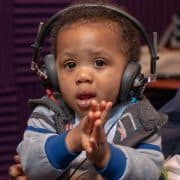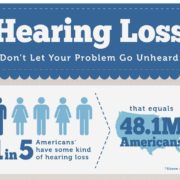Hearing Aids Best for Severe Hearing Loss
Learn How You Can Choose the Best Hearing Aid for Severe Hearing Loss
As a child, Gilbert suffered from a sinus infection that affected his hearing. Normally, hearing loss from a sinus infection is temporary. It is treatable. However, Gilbert wasn’t given the proper medical attention as soon as it occurred. In time, he lost his hearing and he was diagnosed with profound hearing loss.
Over 36 million Americans suffer from hearing loss, states the World Health Organization (WHO). Of this number, more than two million suffer from profound hearing loss. This is the most severe type of hearing loss. People suffering from profound hearing loss often have to rely solely on sign language and lip reading to communicate.
Fortunately, modern hearing aids help mitigate severe hearing loss. If you are like Gilbert and you suffer from severe hearing loss, don’t worry. There are specific hearing aids designed to help you live life to the full.
What Is Profound Hearing Loss?
According to WHO, those with profound, or severe hearing loss are only able to hear sounds that are 80 decibels and above. This means that they may not hear individual voices in a normal setting. Thus, they may struggle to understand and follow conversations. People with severe hearing loss can only hear loud sounds. Sounds like ambulance sirens, car horns, or amplified devices. Profound hearing loss can have many causes, like childhood illnesses or injuries.
The good news is that hearing aid technology has progressed over the last few years. People with severe hearing loss now have more options in experiencing the world around them.
Are Hearing Aids for People With Profound Hearing Loss Different From Regular Hearing Aids?
In a nutshell, yes. Hearing aids for profound hearing loss are different from regular hearing aids.
Also known as, power hearing aids, these are usually the hearing aid of choice for people with profound hearing loss. They offer more amplified sound and longer battery life.
They are also larger and may have different components than regular hearing aids. They include bigger batteries, increased amplification capabilities, and extra technology. These additions make them more useful for people with more severe hearing loss. In contrast, regular hearing aids are smaller and often resemble earbuds or in-ear monitors. They tend to have a slimmer design.
If you are unsure about getting one, let audiological services can assist you. Audiologists and professional hearing care providers can help you figure out if power hearing aids are right for your needs. Make sure to seek advice their advice before going out and picking out your power hearing aid.
Are OTC Hearing Aids Okay for People With Profound Hearing Loss?
Hearing aids that are available over-the-counter can come in handy. But it’s advisable if you or the person you’re buying for has a hearing loss of 80 to 90 decibels (bottom scale serious hearing loss). In this case, you should contact a professional audiological services provider. They can evaluate your hearing and suggest a device that is better suited for your hearing needs.
The same goes for exploring options for different hearing aids. There are benefits and disadvantages, and other essential factors to consider. An audiologist will help you decide which hearing aid is best for your profile. A hearing aid for severe hearing loss is calibrated differently. Consulting a professional will give the right information so you can get the appropriate hearing aid.
What are Best Type of Hearing Aids for Severe Hearing Loss?
Hearing aids come in a variety of styles. But for people with severe hearing loss, two styles are recommended: behind-the-ear (BTE) and in-the-ear (ITE) hearing aids.
These hearing aids differ in size and placement. BTE hearing aids are designed to fit on and behind the ear. ITE hearing aids are smaller and fit completely inside of your ear’s outer canal. They also conduct and amplify sounds in different yet effective ways. For profound hearing loss, your audiologist will help determine which hearing aid is best for you.
How BTE and ITE Hearing Aids Work for Profound Hearing Loss
Behind-the-ear (BTE) hearing aids are popular because of the many features they offer. Its case is fitted just behind your ear and its receiver fitted into your outer ear canal. Sound travels from the hearing aid through the earmold and into the ear. An even newer version is the open-fit type. It has the same design configuration, but is smaller. Instead of an earmold, a narrow tube is inserted into the ear canal. It’s a great hearing aid for people for severe hearing loss because it is small, less of a distraction and is more comfrtable.
If you want something that’s smaller than a BTE hearing aid, the ITE is your best bet. In-the-ear hearing aids (ITE) are smaller and more discreet. It is similar in appearance to the popular molded in-ear monitors. It features a hard-plastic case and is custom made according to individual ear shapes. ITE hearing aids are preferred by many people with profound hearing loss because of its telecoil component. This part helps make hearing to conversations easier. Unfortunately, they are not recommended for young children. This is because ITE hearing aid casings are customized and would need to be constantly replaced as their ears grow.
Choosing the Best Hearing Aid That Works for Your Severe Hearing Loss
To pick the best hearing aids, get help from your audiologist. She/He can help you choose the right ones for your needs and lifestyle. During your consult, be as detailed as possible about your difficulties. Mention activities where you have difficulty hearing other people. This information is essential. It will help your audiologist make the best hearing aid recommendation.
While most hearing aids for profound hearing loss are expensive, don’t base your choice on price. A pricey hearing aid may offer luxury features, but it may not be as effective. Consider convenience and comfort, first. Warranty coverage and upgrade availability are important too. Talk to your audiologist today about hearing aid options and professional audiological services.





